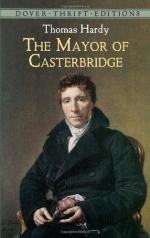Lucetta’s tongue had for a moment outrun her discretion. She had arrived at Casterbridge as a Bath lady, and there were obvious reasons why Jersey should drop out of her life. But Elizabeth had tempted her to make free, and a deliberately formed resolve had been broken.
It could not, however, have been broken in safer company. Lucetta’s words went no further, and after this day she was so much upon her guard that there appeared no chance of her identification with the young Jersey woman who had been Henchard’s dear comrade at a critical time. Not the least amusing of her safeguards was her resolute avoidance of a French word if one by accident came to her tongue more readily than its English equivalent. She shirked it with the suddenness of the weak Apostle at the accusation, “Thy speech bewrayeth thee!”
Expectancy sat visibly upon Lucetta the next morning. She dressed herself for Mr. Henchard, and restlessly awaited his call before mid-day; as he did not come she waited on through the afternoon. But she did not tell Elizabeth that the person expected was the girl’s stepfather.
They sat in adjoining windows of the same room in Lucetta’s great stone mansion, netting, and looking out upon the market, which formed an animated scene. Elizabeth could see the crown of her stepfather’s hat among the rest beneath, and was not aware that Lucetta watched the same object with yet intenser interest. He moved about amid the throng, at this point lively as an ant-hill; elsewhere more reposeful, and broken up by stalls of fruit and vegetables.
The farmers as a rule preferred the open carrefour for their transactions, despite its inconvenient jostlings and the danger from crossing vehicles, to the gloomy sheltered market-room provided for them. Here they surged on this one day of the week, forming a little world of leggings, switches, and sample-bags; men of extensive stomachs, sloping like mountain sides; men whose heads in walking swayed as the trees in November gales; who in conversing varied their attitudes much, lowering themselves by spreading their knees, and thrusting their hands into the pockets of remote inner jackets. Their faces radiated tropical warmth; for though when at home their countenances varied with the seasons, their market-faces all the year round were glowing little fires.
All over-clothes here were worn as if they were an inconvenience, a hampering necessity. Some men were well dressed; but the majority were careless in that respect, appearing in suits which were historical records of their wearer’s deeds, sun-scorchings, and daily struggles for many years past. Yet many carried ruffled cheque-books in their pockets which regulated at the bank hard by a balance of never less than four figures. In fact, what these gibbous human shapes specially represented was ready money—money insistently ready—not ready next year like a nobleman’s—often not merely ready at the bank like a professional man’s, but ready in their large plump hands.




